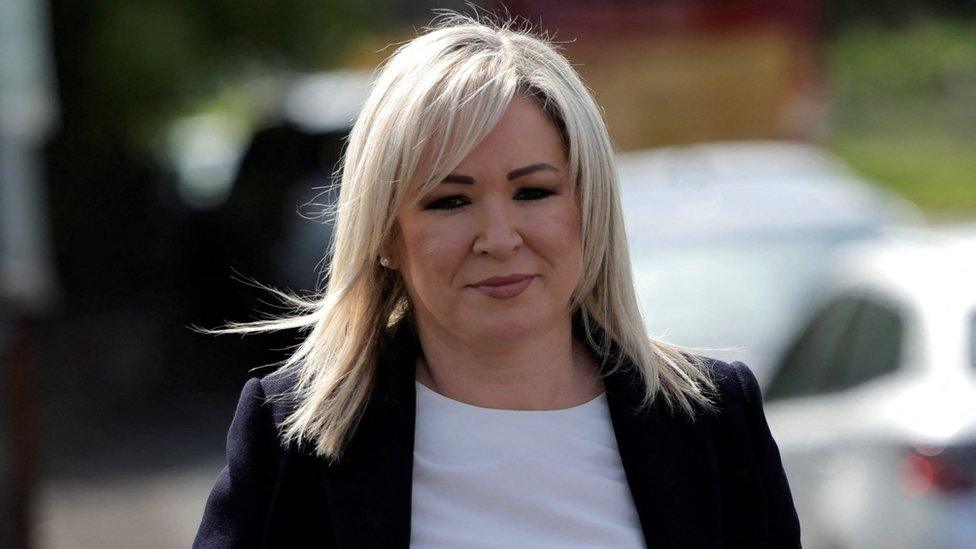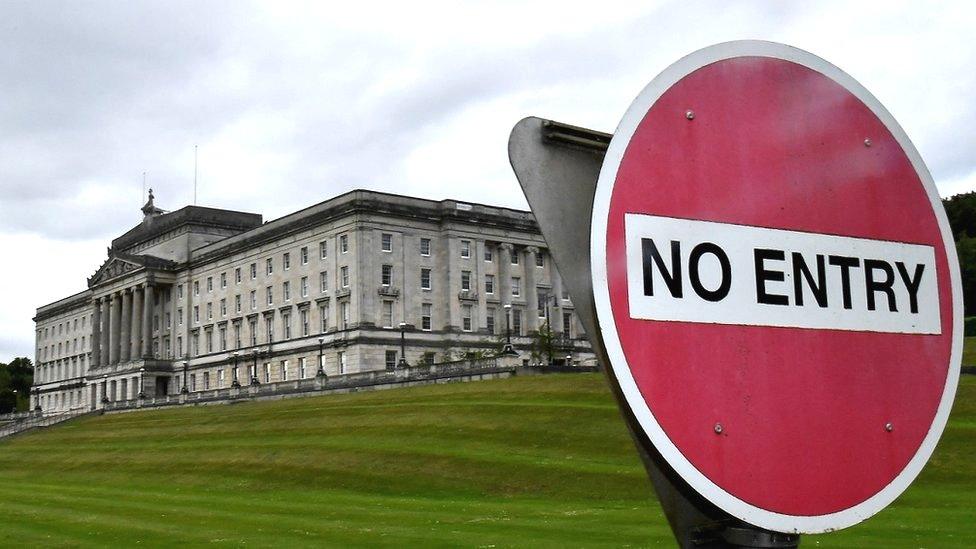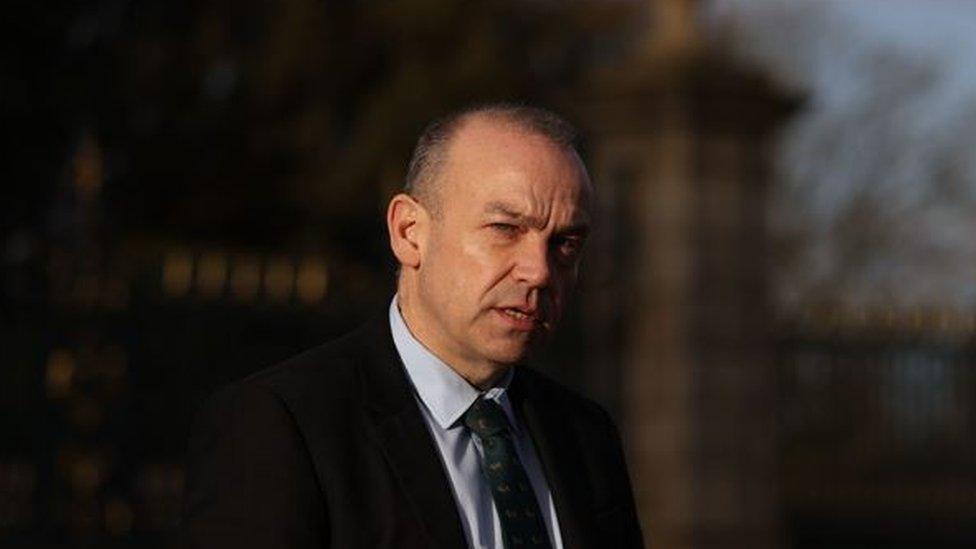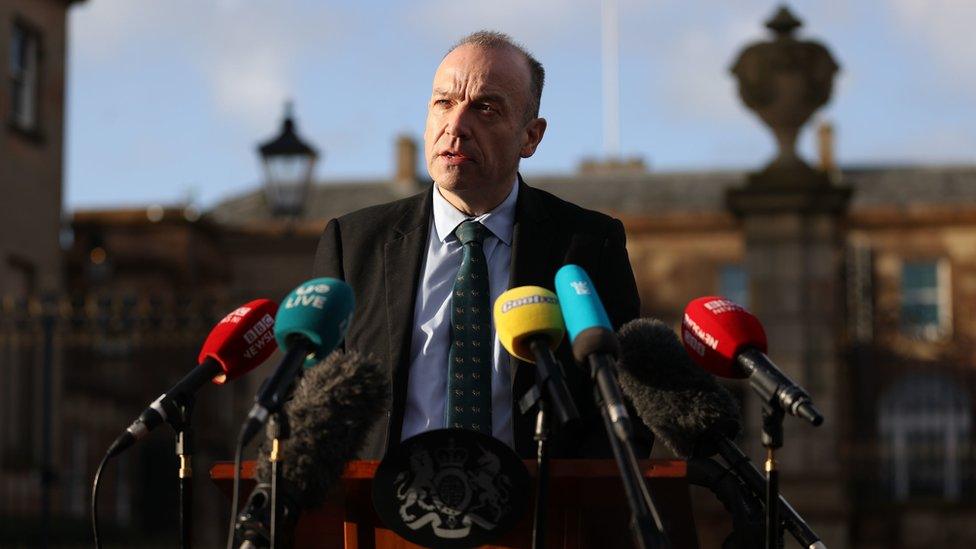Stormont Assembly recall could be its last sitting says O'Neill
- Published
- comments

Michelle O'Neill said there was a "dangerous attempt under way to discard the democratic outcome of the Assembly election"
Wednesday's Stormont recall could be the last sitting of the assembly if the Democratic Unionist Party (DUP) refuses to end its boycott, Sinn Féin has said.
Michelle O'Neill questioned the DUP's motives, saying the "only remaining explanation...is the refusal to accept a nationalist first minister".
However, DUP MLA Gordon Lyons described the recall as a "stunt".
The assembly collapsed in early 2022 due to a DUP protest over post-Brexit trade rules for Northern Ireland.
It has not sat since as the DUP has refused to vote for a Speaker.
During Wednesday's seventh recall of the assembly, another bid to elect a Speaker failed.
Nominations to elect Mike Nesbitt of the Ulster Unionist Party or Patsy McGlone of the SDLP to the role failed to get cross-community support. It meant no further business could take place.
A legal deadline to restore devolved government runs out on Thursday. Without Stormont's return a fresh election will be required.
However, political parties in Northern Ireland have said Northern Ireland Secretary Chris Heaton-Harris has already indicated he will pass new legislation to extend that requirement.

Northern Ireland has been without a devolved government at Parliament Buildings in Stormont for almost two years
The government has already done this on several occasions since devolution collapsed in February 2022.
Speaking on Wednesday, Ms O'Neill said she feared the democratic institutions of the Good Friday Agreement were "in freefall".
"There is a dangerous attempt under way to discard the democratic outcome of the Assembly election, and this threatens our democratic governance, public administration, reconciliation, and the fabric of this society," she told the assembly.
"If Jeffrey Donaldson does not change his approach, then this sitting may well be the final one of this assembly.
"The public looking on here today are not seeing the change they voted for."
'Cynically orchestrated'
Mr Lyons said the recall had been "cynically orchestrated" to coincide with the industrial action "across our public sector".
"This has been done in an attempt to make the public believe that the restoration of the assembly today will lead to the cancellation of the strikes tomorrow.
"Sinn Fein know full well there is no prospect of a Speaker being elected today."
Ulster Unionist Party (UUP) deputy leader Robbie Butler said he "may not get a chance to speak in this chamber again".
He said he believed a "small number of DUP members in the Lords" were the cause of the party's continuing boycott of the institutions.
Need for reform
Alliance leader Naomi Long called for reform to the Stormont institutions in order to prevent future boycotts.
"There is no point coming to this chamber bemoaning the bind in which we find ourselves time and time again," she said.
"The only conceivable reason any party would want to retain the power to collapse these institutions is if they intend to use it or the threat of it to subvert normal democratic process."
Social Democratic and Labour Party (SDLP) assembly member Matthew O'Toole said those in the assembly on Wednesday were serving no one.
"This chamber and these institutions only matter to the extent that they serve the public," he said.
"Tomorrow, true public servants will stand in the cold. They deserve so much better."

Mr Heaton-Harris said there was "no way" his government wanted to go down the route of direct rule from Westminster
Speaking in the House of Commons earlier, Mr Heaton-Harris said there was "no way" his government wanted to go down the route of direct rule from Westminster, with ministers there taking decisions.
He added: "We do not want to go down the route of joint authority [with Dublin]."
He said the government was working "unbelievably hard" with parties to restore power sharing.
The last period of direct rule in Northern Ireland ended in 2007, and reinstating it would be a controversial move. Direct rule is not favoured by some because it takes power out of local hands.


Even before MLAs took their seats in the chamber there was a sense devolution was doomed.
The word around the Stormont corridors suggested this could be the last Assembly sitting for some time.
It felt like the moment to restore the Executive has now passed.
That same sense was evident at Hillsborough Castle on Monday when the secretary of state told the parties there was no evidence the DUP was preparing to end its boycott.
At Westminster on Wednesday, Chris Heaton-Harris said he hoped the DUP could come to a conclusion in the "days and weeks" ahead.
He hasn't totally given up hope but most of the Stormont parties, outside the DUP, have.

The assembly sitting came one day before thousands of public sector workers in Northern Ireland go on strike over pay and conditions.
Why did devolved government in Northern Ireland stall?
The DUP has been blocking the restoration of Stormont's power-sharing institutions since 2022 in protest against post-Brexit trade checks between Northern Ireland and Great Britain.
It believes the arrangements under the Northern Ireland Protocol diminish the region's place within the UK internal market.
A new deal, called the Windsor Framework, aimed at addressing those concerns was agreed in February 2023 between the government and European Union.
But the DUP said this did not go far enough, and for months the party has been in talks with the government seeking further changes.
In December, Chris Heaton-Harris said those talks had "effectively concluded" and offered a £3.3bn financial package for Northern Ireland if the Stormont institutions were restored.
That financial package includes almost £600m to solve the pay disputes at the heart of the public sector strikes.
The government has refused to release the cash in time to avert the strikes, insisting it is tied to the restoration of the executive.
- Published15 January 2024

- Published12 January 2024

- Published19 September 2023
